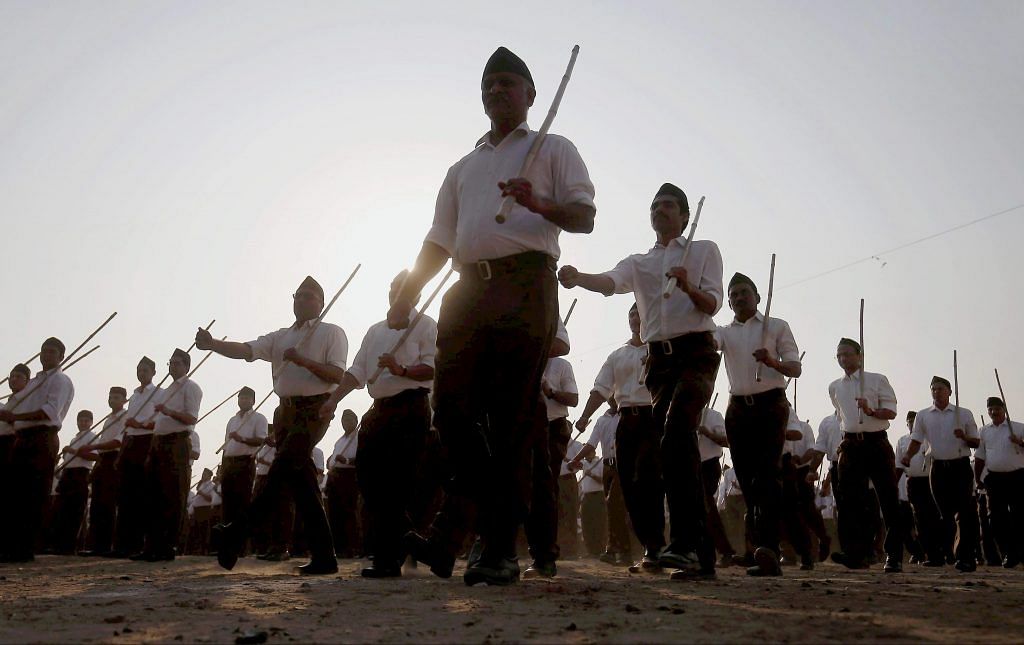The disappointment of the RSS goes beyond Article 370, Uniform Civil Code, Ram Mandir or differences in economic policy.
The unhappiness of traders, farmers, minorities, Dalits and the unemployed with Prime Minister Narendra Modi’s government and the Bharatiya Janata Party (BJP) president Amit Shah, have been discussed widely.
But one of the government’s biggest, but least debated failures, is its inability to fulfil the aspirations of its ideological parent, the Rashtriya Swayamsewak Sangh (RSS). The organisation lent enormous support to the BJP before the 2014 Lok Sabha elections, not just to ensure a political victory for the party but also for itself to be strengthened.
The disappointment of the RSS goes beyond Article 370, Uniform Civil Code, Ram Mandir or the differences in economic policy, over which the RSS leaders have criticised BJP’s decisions several times.
The real problem between the BJP and RSS is much deeper. When the BJP came to power in 2014 on the agenda of development, the RSS too pinned its hope on a progressive roadmap for safeguarding Hinduism. The issue of religious conversion is at the heart of the work that many of the RSS outfits engaged in. A major factor for religious conversions in tribal areas and the northeast is the quality service provided by Christian missionaries. RSS members have often said that the Indian state has failed to provide quality education, healthcare and other services, ceding ground to the missionaries’ activities. The missionaries went on to build schools of superb quality, beating most other private schools in vast parts of the country. The schools and hospitals they opened in the jungles of Jharkhand and in the northeastern states boosted religious conversions.
Functionaries of the RSS realised long ago that the only legitimate way to counter this was for either the state to provide basic amenities to people or for the Sangh to take over the mandate and compete in the provision of services.
This is where the RSS expected the Modi-led BJP government to help.
The RSS runs several volunteer organisations and NGOs in the field of education, healthcare and livelihood. Seva Bharati, an NGO established by RSS Sarsanghachalak Balasaheb Deoras in 1979 has actively been working among the most socio-economically marginalised sections of society. The RSS-backed Vidya Bharati operates the largest network of private schools in the country and has been running schools since 1977. Despite operating over 12,000 schools like Saraswati Shishu Mandir and Saraswati Vidya Mandir, they have failed to have widespread impact. This is because of the huge gap in the quality of services delivered and the available funds between the missionary-run institutions and the Sangh.
Modi himself commented on the inferior quality of Sangh-backed institutions and expressed his desire for better quality Vidya Bharati schools when he addressed a conclave of principals of schools run by Vidya Bharati Akhil Bharatiya Shiksha Sansthan in early 2016.
To compete with the quality of other private institutions, a large section of the RSS had hoped that the Modi government would help them with funding with Corporate Social Responsibility (CSR) funds and through government schemes. Both BJP and RSS members spoke about setting up Sangh-backed model schools and hospitals in every district of India. The presence of people like Wipro chairman Azim Premji at Rashtriya Sewa Sangam, a conclave of NGOs convened by the RSS in 2015, seemed to be a step in this direction. A meeting between Ratan Tata and RSS chief Mohan Bhagwat to discuss social work initiatives also raised people’s expectations. Unfortunately for the Sangh, not much materialised after these meetings.
The hope for such measures was alive well into 2017. But now even the conversations around this issue have disappeared in the RSS-BJP circles. In the polarised run-up to the 2019 election, there is little hope of such positive agenda ever returning to the hearts and minds of RSS karyakartas.
It’s becoming increasingly clear now that the BJP’s political agenda has dwarfed any positive agenda that the RSS had developed in the run-up to the 2014 elections. Instead of strengthening its own institutions, the goal has become to demonise Muslims and Christians so that a unified Hindu vote bank can be built. This is the true failure of Modi-Shah.
Shivam Shankar Singh handled data analytics for the BJP’s poll campaigns in the northeast, is a 2015-16 Legislative Assistants to Members of Parliament (LAMP) Fellow, and an alumnus of University of Michigan, where he studied economics.
